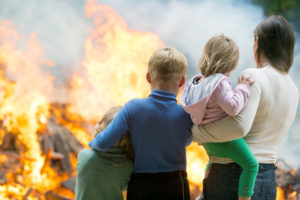 For most of us the carefully wrought, precarious balance of our family systems depends on everything operating as expected. But what happens when an event smashes that equilibrium? Last week I had a come-to-Jesus encounter with that kind of disruption.
For most of us the carefully wrought, precarious balance of our family systems depends on everything operating as expected. But what happens when an event smashes that equilibrium? Last week I had a come-to-Jesus encounter with that kind of disruption.
I have mentioned previously that I care for my terminally ill spouse and I watch my eight-month-old grandson three days a week as well. These responsibilities are both a cherished privilege and require a great deal of time and energy. Don’t feel sorry for me; I’m a natural caregiver and truly find myself spiritually nourished when I am in service. My job is eminently flexible and allows me to fit everything in. Still, I do get tired, need some solo time and value my own priorities (like writing, coaching, advocating for better adoption practices, and spending time with friends and colleagues.) Sometimes enjoying all of the pieces of my pie–my Have Tos as well as my Choose Tos–threatens to crash the entire system.
So when I had an unanticipated health event, reality tore down the fragile balance of the responsibilities I juggle. As I lay in bed, thoughts ricocheted through my head: Who can I call? Can the VNA send immediate round-the-clock help? What if I need to go the hospital? Would my DIL lose her job if she had no child care? I’m the healthy one, the hub of the wheel that keeps everything functioning. Fear and worry careened my mind into many directions. I’m sure you can easily relate.
Fortunately the situation resolved positively. Once the crisis past, my daughter and I had a long overdue, Difficult Conversation of the highest order: What to do if... She now knows who to notify, who to call on for help, and how to pay for everything, etc.
This made me think about parenting in adoption. Beyond the “normal” challenges of raising a family, working and sustaining a marriage (or significant-other partnership,) adoptive families have additional roles, relationships and challenges to juggle. We get used to handling mind-numbing stresses and living life as the ultimate roller coaster ride. But… What if you or your spouse suddenly got sick? If you totaled your car, lost your job, or one of your kiddoes came totally unglued, what emergency plan do you have?
I’m guessing that few of us have a really detailed blueprint of whom to call upon for help. Perhaps we have casual agreements: My sister would take the kids; My Mom would come and stay; Joe could carpool, etc. Are you and your spouse (partner,) on the same page? Have your resource people actually agreed? Or is your plan based on assumptions? And we all know where assumptions land us, right?
The middle of a crisis is the worst time to be scrambling for resources and the assistance that you need. Do yourself a favor and brainstorm with your partner now and persist until you’ve developed a specific plan. Have those Difficult Discussions; if there’s anything adoptive parents know, it is that life does not always go the way we plan. Actually, make that two plans: one for short-term problems and one for long-term. Be sure you have written things down. Have notarized permissions that allow others to access healthcare for your kids–and you–if you are unable to make those decisions. Compile a file that has their medical information, physician’s names, numbers, etc. Have a legally binding agreement that specifies who would care for your kids if something happened to you and/or your spouse (or partner.) What if neither of you could communicate?
While these events are unpleasant to confront, it is an act of love to ensure that you provide care and custody for your kids with people who would welcome and love them (as opposed to agreeing to it because they feel they “should.”) Review your plans periodically; people and their circumstances change. Your choices may have to be adjusted to reflect those changes.
Take the first step
- Schedule that conversation.
- Create the plans.
- What’s your first step?
- Take it.
- Listen to our podcasts: Adoption Matters: Real People. Real Life. Real Talk and Essentials of Adoption Attuned Parenting
Read Books written by our coaches
Click to learn more about Adoption Attuned Certified coaching!



As I have stated recently, based on event that have occurred in my own life, “circumstances can change in an instance and chaos will rule if you don’t figure out, in a calm & timely fashion, what to do next”. When events occur in our life, it is not about the circumstances itself. It is about how we will make the necessary changes with regard to those circumstances. Flexibility is a key ingredient when face with traumatic experiences. So calmly preparing for those life-changing events will assist you and others moving forward.
I really like this idea of having a short term/long term plan for what to do when the unexpected happens. Several things could be stopping us from accomplishing this: FEAR of even thinking about it, LACK OF TIME to make it happen, or just plain feeling OVERWHELMED in how to go about it (my personal fave! :). Breaking this “difficult conversation” into smaller steps — short term and long term planning as you suggested – and choosing a specific date to sit down and do it is a good start. Also remember to keep your plans “Adoption-attuned.” #adoption #adoptivefamilies #AAQ